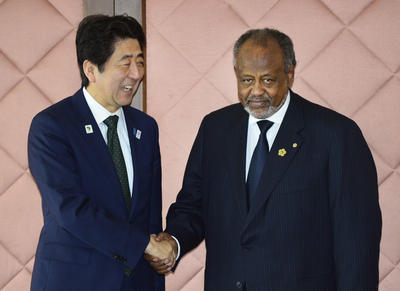Although it is not widely known, Japan has taken a leadership role in the international community for several decades with regards to African development. While China has established very visible trade and investment ties to the African continent, Japanese relations to Africa are often carried out under the radar. Attendees at TICAD, sponsored and hosted by the Japanese government, included the Secretary-General of the UN, the President of the World Bank, over 40 African heads of state and many non-profit organisations.
In addition to the notable participants gathered together for several days, another of TICAD’s unique traits is that the Japanese government has held these conferences every five years since 1993. Japan stands alone among wealthy countries that have sponsored such extensive discussions with African leaders.
Japanese Prime Minister Shinzō Abe announced during the meetings that his government is pledging US$32 billion in foreign aid and private investment in Africa over five years. Japan has committed itself to dramatically increase its foreign aid to Africa by US$14 billion with an additional US$6 billion in infrastructural support. The rest will come from private Japanese companies investing in the continent. These figures, while substantial, will need to be maintained if Japan wants to successfully compete with China in Africa’s expanding markets.
Yet this substantive global conference was not without controversy.
First, in a rare public appearance outside of Zimbabwe, President Robert Mugabe attended TICAD. Mugabe, now 89, spoke critically about the reluctance of foreign companies to offer their technology to African societies and expressed disapproval for what he sees as foreign meddling in the African continent. Second, China’s role in Africa was barely mentioned and some referred to it as the ‘hidden agenda’ behind Japan’s own relationship with the continent. Japan needs to decide whether it can compete with China or whether it should seek to collaborate with this other Asian power. Third, with public-private partnerships between the Japanese government and Japanese businesses being an important part of Japan’s investment in Africa, some are concerned that this business approach may direct efforts away from humanitarian and human security needs in Africa. Finally, the Japanese public’s support for foreign aid policy to Africa has been weakening, especially after the environmental and nuclear disasters at Fukushima in 2011. This raises the possibility that Japanese public opinion in the context of domestic tragedies may derail Prime Minister Abe’s $32 billion commitment.
While Africa’s economy has been growing by around 5 per cent per year, much of that new wealth remains under the control of African elites. For more comprehensive development, more work needs to occur with the construction of effective and efficient infrastructure, the development of a vibrant middle class, the implementation of environmental policies, and the protection of human rights and human security. The small but vocal group of Japanese NGOs at the TICAD meeting highlighted this concern of expanding the view of development. For these NGOs, economic growth is necessary, but not sufficient in order to achieve development.
Japan can play a crucial role in assisting African governments towards these goals, and TICAD represents a notable example of global collaboration and Japanese leadership focusing on African development. But this last TICAD meeting suggests that Japan also wants to promote the economic opportunities of Japanese businesses in Africa. Trade, in addition to aid, is driving Japan’s foreign policy towards the African continent. Trade is crucial for sustainable development, but Japanese foreign policy to Africa must not be hijacked by its domestic commercial interests.
Howard P. Lehman is Professor of Political Science at the University of Utah. He was an official observer at the June 2013 Tokyo International Conference on African Development.


Professor Lehman,
Thank you for the interesting and informed comment. That you attended the conference is even more impressive. But I’m afraid you are too generous. Certainly there is no excuse for ignorance of TICAD among the Western press and others with a professional interest in Japan.
Scott Foster
Tokyo
Scott,
Thanks for your comment. I do agree with you that those in the Western press should be more aware of what other countries are doing in Africa. However, it seems that China has pushed Japan to the side. Howard Lehman